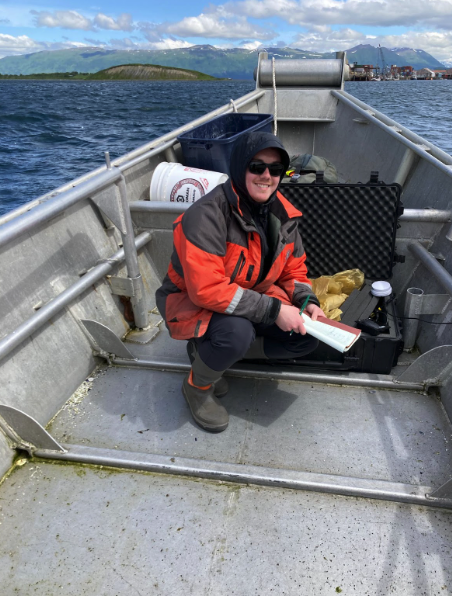Kelp, oysters and outboards: energy efficiency meets regenerative ocean farming
August 24, 2023

Kristian Nudlash-Barger logging data in Larsen Bay.
This article is part of a series highlighting ACEP’s 2023 cohort of eighteen undergraduate interns. To read about other projects and learn more about the program, please visit the ACEP Internship Program website.
Kristian Nudlash-Barger is a sophomore at the University of Alaska Anchorage studying electrical engineering. His hometown is Dillingham, Alaska where he grew up commercial fishing.
This summer, Nudlash-Barger returned to Dillingham to analyze energy usage in oyster and kelp farms alongside mentor Chandler Kemp, assistant professor of sustainable energy at the University of Alaska Fairbanks Bristol Bay Campus.
Nudlash-Barger first examined relevant research done in the past. He then went on a trip with Kemp to Kodiak, Larsen Bay, and Sitka to record data from mariculture vessels, using a NMEA 2000 system that he designed. His system logs and displays fuel data, GPS data, and various engine outputs such as rpm (revolutions per minute), all in real time. After logging vessel data, Nudlash-Barger spent the rest of his time writing Python code to make the data easily accessible and readable.
This research is important as there is very little published information on energy usage in mariculture. The research by Kemp and Nudlash-Barger will lay the groundwork for a “best-practices guide” in mariculture energy efficiency.
Alaska’s mariculture industry is set to expand rapidly over the next decade with the help of nearly $49 million in grants that the Alaska Mariculture Cluster has won as part of the Build Back Better Regional Challenge. The grants will ensure that the portion set aside for energy efficiency will be well used.
Nudlash-Barger had a positive internship experience learning about marine electronics, Python, and the mariculture industry. He appreciates the freedom given to explore and research on his own.
“I was even given control over our equipment budget!” he said.
The mariculture vessel trip made him realize that he truly enjoys fieldwork, and the connections he made are “the most valuable thing I got out of this internship.”
“I now know many of the leaders in the mariculture industry, and I think my relationship with ACEP will help me grow professionally,” he said.
This internship is funded by Alaska Regional Collaboration for Technology Innovation and Commercialization (ARCTIC) program and UAF Alaska Blue Economy Center through the ACEP Undergraduate Summer Internship program. View the final presentation for this project on ACEP’s YouTube Channel. For more information on this project, please contact Chandler Kemp at ckemp6@alaska.edu.


